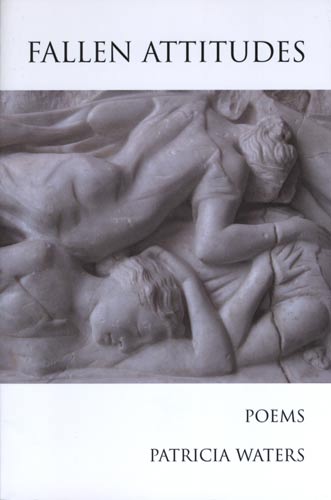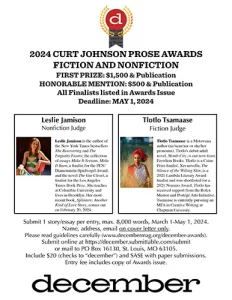Fallen Attitudes
Patricia Waters’s Fallen Attitudes beautifully betrays her artistic and intellectual maturity. This is not novice poetry, but poetry in which scenes, locations, history, and memory are culled for what they cannot possess rather than for epistemological revelations. Waters is not attempting to prove anything, to justify a life lived a certain way; this is a memoir of letting go of proof and justification, of finding peace with whatever remains, and what remains seems to be a love. Patricia Waters’s Fallen Attitudes beautifully betrays her artistic and intellectual maturity. This is not novice poetry, but poetry in which scenes, locations, history, and memory are culled for what they cannot possess rather than for epistemological revelations. Waters is not attempting to prove anything, to justify a life lived a certain way; this is a memoir of letting go of proof and justification, of finding peace with whatever remains, and what remains seems to be a love.
Nothing befits this free-falling attitude, this grace, more than the book’s historical/artistic backdrop in which Waters embraces Cy Twombly’s graffiti-like works of art with its romantic symbolism and illusions to classical myths and allegories. Her own poetry is laced with classical mythology, romantic symbolism, and admiration for the painter, as well as recognition of other poets and artists. The poem “For Cy Twombly Blooming,” the longest poem in the book, weaves together all of these threads in its exploration of Twombly’s “Blooming,” a mixed-media depiction of peonies. The poem begins with an epitaph (a poem) about peonies, moves into the scientific name and classification of peonies, physical characteristics, meaning in various cultures, and then slowly arrives at the personal reflection—what the peonies speak to the poet. Says the poet:
I know no more now than I did when I loved without thought.
The scent returns emanant from the peony’s heart—
gorgeous, prodigal, singing.
There is wisdom in these lines and pages that comes with thoughtful speculation. The poem preceding “For Cy Twombly Blooming” is titled “So many things lost—” but then defies the expectations of the reader by listing the simple pleasures attained on one “first day of summer” in France. Waters speaks, throughout these poems, of temporal losses such as a house foreclosed in “Foreclosure,” the death of a parent in “Mother,” and, in the last untitled poem, the passage of time. Nevertheless, the poetry is inspirited with gains; the poet has known love and does not lament her losses but, rather, is unburdened by love’s fulfillment, surrender, and revelry in her life.
This is not a collection that can be read quickly; it is for the reader willing to carefully consider the many symbols and allusions along the way. There are references to history, locations, other artists, artworks, classical myths and allegories, dictionary definitions, and etymologies. Waters, however, has kindly provided a short reference at the back of her collection along with some personal notes about the poetry. Furthermore, any of the events, individuals, and works referred to in the poetry can be easily discovered through a quick internet search and, indeed, the information provided enhances one’s reading of the poetry. In other words, the references in this collection are not haphazardly placed in the poems to mimic intellectual and artistic maturity—this is an intellectually and artistically mature collection.
This collection can satisfy any reader as it provides a number of poetic forms, everything from lengthy narrative to brief cinematic snapshots. The poetry is both deeply philosophical and pleasantly familiar. One can read it as a journey through time and place or as an intimate association with the poet’s muses. I know of at least one muse I intend to become more acquainted with after reading this collection—Cy Twombly. My own internet search yielded a world of artwork I had not previously known, and I have already placed a hefty, pricey book of his collected works on my wish list where I hope it will not linger for long.





